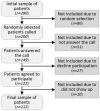Impact of a Mediterranean diet, physical activity, body composition, and insulin delivery methods on metabolic control in children with type 1 diabetes
- PMID: 38249596
- PMCID: PMC10799333
- DOI: 10.3389/fnut.2023.1338601
Impact of a Mediterranean diet, physical activity, body composition, and insulin delivery methods on metabolic control in children with type 1 diabetes
Abstract
Aims: To evaluate the synergistic impact of diet, lifestyle and technology on glycemic control in children with type 1 diabetes (T1D).
Methods: This cross-sectional study included 112 randomly selected patients with T1D from Gran Canaria (median age 12 years; 51.8% female). The study collected data on height, weight, body composition (bioimpedance), age, disease duration, and method of insulin delivery. Physical activity was evaluated using the Krece questionnaire and an accelerometer (GENEActiv). Adherence to the Mediterranean diet was assessed using the KIDMED Quick Nutrition Test. Glycemic control was evaluated using HbA1c and the percentage of time in range. SPSS version 21 and RStudio were used for statistical analysis of the data. Stepwise linear regression analysis (backwards) was used to identify factors independently associated with metabolic control.
Results: Insulin pump use, age and adherence to the Mediterranean diet were found to be significantly and independently associated with better glycemic control, whereas years with T1D was associated with worse HbA1c values. No relationship was found between body composition and physical activity measured by accelerometry or questionnaire.
Conclusion: Adherence to the Mediterranean diet, insulin delivery methods, age, and number of years with T1D are important factors to consider in the management of T1D in children.
Keywords: HbA1c; body composition; children; diet; nonpharmacological; physical activity; type 1 diabetes.
Copyright © 2024 Nóvoa-Medina, Pérez-Lemes, Suárez-Ramírez, Barreiro-Bautista, Fabelo, López-López, Quinteiro, Domínguez, León, González, Caballero and Wägner.
Conflict of interest statement
The authors declare that the research was conducted in the absence of any commercial or financial relationships that could be construed as a potential conflict of interest.
Figures
References
-
- Banting FG, Best CH. The internal secretion of the pancreas. 1922. Indian J Med Res. (2007) 125:251–66. PMID: - PubMed
-
- Nathan DM, Genuth S, Lachin J, Cleary P, Crofford O, Davis M, et al. DCCT reseach trial. N Engl J Med. (1993) 329:977–86. PMID: - PubMed
-
- de Bock M, Codner E, Craig ME, Huynh T, Maahs DM, Mahmud FH, et al. ISPAD clinical practice consensus guidelines 2022: glycemic targets and glucose monitoring for children, adolescents, and young people with diabetes. Pediatr Diabetes. (2022) 23:1270–6. doi: 10.1111/pedi.13455, PMID: - DOI - PMC - PubMed
LinkOut - more resources
Full Text Sources



